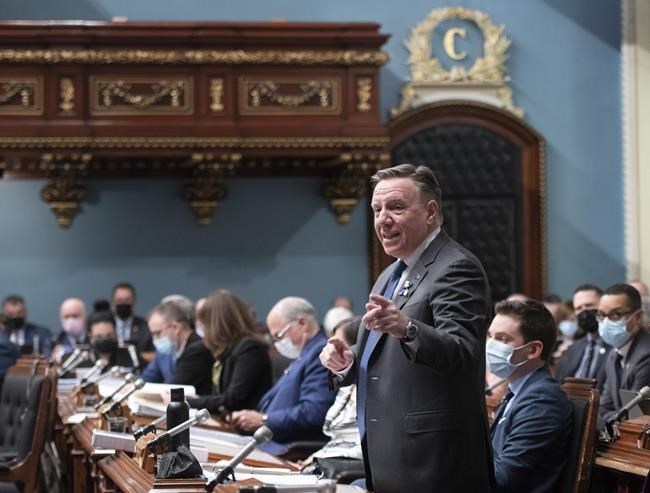
Quebec Premier François Legault responds to the Opposition during question period Tuesday, March 22, 2022, at the legislature in Quebec City. The debate over electoral reform has resurfaced in Quebec ahead of the fall election, with opposition parties raising the alarm over projections suggesting the ruling Coalition Avenir Quebec government could walk away with as many as 100 of the province's 125 seats. THE CANADIAN PRESS/Jacques Boissinot
May 02, 2022 - 9:49 AM
MONTREAL - The debate over electoral reform has resurfaced in Quebec, with opposition parties raising alarm over projections indicating the ruling Coalition Avenir Québec could walk away with 100 of the province's 125 seats next October.
Poll-aggregating website Qc125.com has Premier François Legault's CAQ with about 42 per cent support — which would translate into roughly 80 per cent of the seats if current trends hold.
In response, Parti Québécois member Pascal Bérubé said last week Quebec was suffering from a “democratic crisis” and he blasted Legault's government for abandoning its promise of electoral reform. The electoral system, Bérubé lamented, is producing an "unprecedented distortion between the real voting intentions and the representation to come in the next legislature."
Philippe Fournier, who runs Qc125.com, says that distortion is being caused, in part, by the rise of smaller political parties. His website has five parties with an average of at least 10 per cent support in the latest polls — which Fournier says has never been seen before in Quebec politics.
Under Quebec's first-past-the-post system, the candidate with the most votes — even if their support is well under 50 per cent — wins the seat. Fournier said the fragmenting of the vote means it’s possible for a party to win a seat with less than 30 per cent support, compared to the nearly 50 per cent that was needed in the years when the Liberals and PQ were the two main political forces.
“Having five parties that are, you know, polling in the teens is a big problem for the smaller ones, and (it's) very beneficial to the one that is leading,” Fournier said in a recent interview.
Legault's CAQ appears poised to benefit the most from the drop in support for the Quebec Liberals and the PQ. Quebec's smaller parties, in contrast, are being disadvantaged by the current system. If current polling trends hold, the Conservative Party of Quebec, which is polling at about 14 per cent, could win no seats, and the once-mighty PQ is projected to win about one, despite having 10 per cent support.
Bérubé said electoral reform was a key promise made by Legault’s party in 2018, when the CAQ leader committed to tabling a bill within the first year of taking power. After winning the 2018 election, the CAQ did introduce legislation for a mixed electoral system, under which 45 of the province’s 125 ridings would be distributed based on proportional representation. The party also said Quebecers would vote on its plan in a referendum held at the same time as the October 2022 election.
Work on that bill ceased, however, long before the steps were completed toward it becoming law, Legault acknowledged last week. While the premier blamed the COVID-19 pandemic for delays, he did not commit to reviving the bill, saying electoral reform “isn’t really a priority” for Quebecers.
Dennis Pilon, a political science professor at York University, said Legault appears to be following a time-tested tradition in Canadian politics: committing to electoral reform when in opposition but backing off once elected.
Prime Minister Justin Trudeau is the most recent example of a politician backtracking on a pledge to change the system. The Liberal leader had repeatedly promised that the 2015 federal election would be the last one under first past the post.
There's a long history of other parties doing the same — including the Parti Québécois. Pilon said various PQ leaders have called for electoral reform ever since ex-PQ leader Réné Levesque did so in the 1970s — before he allowed the idea to fizzle out when in government.
“What we see with the PQ in the 70s is the pattern that is followed by every single party subsequent to the PQ, which is that once they get power they start backing away from the promises,” he said. The distortion of the current system, Pilon added, amounts to a “democratic crisis,” but he said he is not confident anything will be done about it.
The system, he said, tends to “over-represent the largest parties and turn a minority of votes for the largest party into a legislative majority, (which) is seen as one of its great strengths according to its proponents and a serious democratic weakness by its critics."
Pilon said the system also actively discourages people from voting for smaller parties unless they are regionally concentrated, like the Bloc Québécois at the federal level.
Political fragmentation, Pilon said, is happening in both provincial and federal politics. In the 2021 election, the Liberals lost the popular vote to the Conservatives and won government with less than 33 per cent support.
While Pilon says the rise of smaller parties can sometimes push countries toward electoral reform, both he and Fournier note that parties who backtrack on their electoral reform promises are unlikely to change their ways unless they pay a political price.
In Canada, that's not happening. Trudeau has been re-elected twice since abandoning his electoral reform promise, and Fournier says there's no sign Legault's support is wavering.
"Will the CAQ lose any votes because of this? My guess is no, or very few," Fournier said.
This report by The Canadian Press was first published April May 2, 2022.
News from © The Canadian Press, 2022